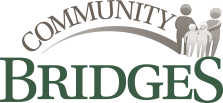Family-Directed / Self-Directed Services
Our goal is to support people so they can reach their desired personal life outcomes. Getting necessary and appreciated supports and services puts dreams within reach for people living with intellectual /developmental disabilities or acquired brain disorders. Community Bridges’ Family-directed / Self-directed services helps people with an intellectual/developmental disability or acquired brain disorder and their family to take a lead role in managing the services and supports they receive.
A Family-directed / Self-directed service approach means that you and your family have optimum control over program management, including designing service plans and choosing who provides services. You also have some level of control over the use of funds for certain services (within the parameters of Medicaid-covered services and guidelines within state regulations). This differs from an agency-managed approach in which a contracted provider agency executes program management, including staff recruitment, hiring and oversight, and management of approved service funds.
Services are intended to promote personal growth, responsibility, health, and safety so participants experience independence, are meaningfully included in the community, are employed, and enjoy a fulfilling home life. Support staff can be directed to provide a wide variety of assistance—all under your direction and supervision.
The two types of Family-Directed / Self-Directed Services
In-Home Supports – He-M 524:
Home and Community-Based Services for In-Home Supports (HCBS-IHS) offers a variety of services for people aged 3 through 21 with a developmental disability and significant medical or behavioral challenges. Supports are intended to help a child live at home with their family and participate in community experiences. Services are geared toward developing basic personal and functional living skills, improving physical functioning, communication, and relational skills, and addressing challenging behaviors.
Specific child and family factors and eligibility criteria help identify whether a particular situation rises to the level of need to request In-Home Support. There are funding limitations at the state level for new In-Home Support service development. We encourage you to speak with your Service coordinator to arrange an overview of In-Home Support if you would like to learn more.
Participant Directed and Managed Services (PDMS) – He-M 525:
This service structure is for people over the age of 21. The scope can include a wide variety and combination of services allowed under the HCBS-DD or HCBS-ABD Medicaid Waivers. To be covered through a PDMS budget, the support needs to be related and due to disability and not a generic need or cost that anyone may experience. Service type can include, but is not limited to:
- Developing increased personal competencies and skills in personal decision-making, daily living skills, accessing community resources, personal, household, and community safety, and maintaining health, well-being, and nutrition.
- Researching and participating in meaningful community activities, events, organizations, and clubs per personal interest
- Career development and employment supports
- Personal Care
- Environmental or vehicle modifications, assistive technology
- Therapies – PT, OT, Speech – beyond what regular Medicaid can pay for, or specialized therapies such as Hippo therapy or craniosacral therapy
- Respite services for those living with their families
MITC
He-M 500 Administrative Rules
